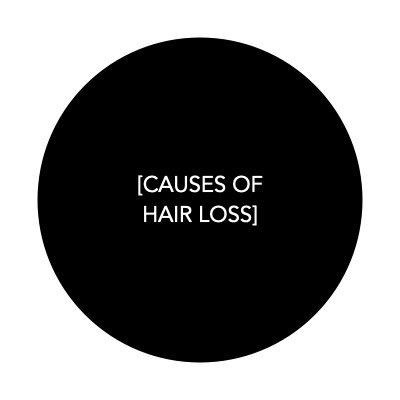Causes of Hair Loss
Podcast: Play in new window | Download
Subscribe: Apple Podcasts | Spotify | RSS
CAUSES OF HAIR LOSS
Hair loss can be caused either by an isolated problem or a combination of factors including genetics, chronic medical diseases such as a thyroid problem or underlying anemia (low blood count), poor nutrition, etc.
Chemical treatments performed in hair salons, such as hair dyes, bleaching, perming and rebonding hair, can cause a form of hair loss from breakage of the hair shaft. In the hospital setting, patients undergoing chemotherapy usually suffer from a form of temporary hair loss, caused by the hair follicles entering into the resting phase whereby they are shed.
Namely, as our hair growth cycle goes through 3 main phases — active growth caused by anagen, transitional growth caused by catagen and inactive growth and shedding caused by telogen. An impact in any of these stages caused by the abovementioned factors can lead to loss in hair density due to less hair on the scalp present in the growth or anagen phase.
Here is a comprehensive list of some of the most common causes of hair loss:
- Hormones, abnormally high levels of male hormones in females.
- Genes, from both parents in male or female pattern baldness.
- Childbirth, emotional stress, illness — these are causes of temporary/reversible hair loss known as telogen effluvium.
- Fungal infections such as Ringworm, Tinea capitis caused by dermatophyte infections i.e. microsporum canis and trichophyton rubrum.
- Medications such as chemotherapy medications in cancer treatment, birth control pills.
- An underlying autoimmune disease which attacks the hair follicles, known as alopecia areata. This is genetically influenced and those with a family history of such a condition will have a high risk of getting this condition. It is also linked to conditions such as Graves Disease and Hashimoto’s thyroiditis.
- A form of scarring alopecia from traumatic injuries, burns, X-rays.
- Chemical procedures such as perms, bleaching, and dyeing hair can cause hair breakage.
- Trichotillomania, a psychological disorder affecting children, teenagers and young adult females — a condition in which the affected person compulsively pulls out his/her own hair.
- Telogen effluvium is a temporary, reversible reaction to stressors such as an acute severe illness or to pregnancy or emotional/psychological trauma. This is due to changes in the growth cycle of hair. A proportionately increased number of hairs enter the resting phase known as telogen at the same time, as opposed to normal hair which forms 90% of scalp hair in the active growth phase, causing increased hair shedding and subsequent thinning.
- Tight hairstyles and using instruments like rollers or hot curlers. Tightly braided hair and hot combs can also result in permanent hair loss by trauma.
- Anemia,thyroid illnesses, autoimmune diseases such as lupus, diabetes, iron deficiency and eating disorders can lead to hair loss.
- Poor Diet — an extreme severely calorie-restricted diet or a low-protein diet can also cause temporary hair loss.
- Involutional alopecia is a natural degenerative condition whereby hair thins with age. Proportionately increased hair follicles go into a resting phase, and existing hairs become shorter and fewer in number.
- Androgenetic alopecia is a genetically influenced condition that affects both men and women. For males with androgenetic alopecia, they can even begin suffering hair loss from their teens or early 20s. Some signs of this condition are a receding hairline and thinning of hair from the crown and frontal scalp. Women generally experience this later in life. With a general thinning over the entire scalp, often with the worst hair loss at the crown.
- Alopecia areata is a rare condition which may start suddenly and lead to patchy hair loss in children and young adults. Although rare, this may progress to complete baldness (alopecia totalis), whereby a person loses 100% of scalp hair. Hair regrows within a few years in about 90% of people with the condition. The most severe form of this condition is known as Alopecia universalis, which causes all body hair to fall out, including the eyebrows, eyelashes, and pubic hair.
- Scarring hair loss can be picked up by a trained dermatologist as the hair follicles have been permanently damaged and it may be impossible for the hair to regrow over the same areas again. This is comparatively rare but medical conditions such as scalp cellulitis, dissecting cellulitis, folliculitis, folliculitis decalvans, if left untreated, can lead to severe scarring alopecia. Some forms of lupus, such as discoid lupus erythematosus on the scalp, results in discolored bald patches on the scalp. Lichen planus is another inflammatory scalp condition that can destroy the follicle leaving hair unable to grow again.
– Excerpt from The Haircare Bible: Dermatologist’s Tips For Haircare And Hair Loss, by Dr. Teo Wan Lin.




Leave a Reply
Want to join the discussion?Feel free to contribute!